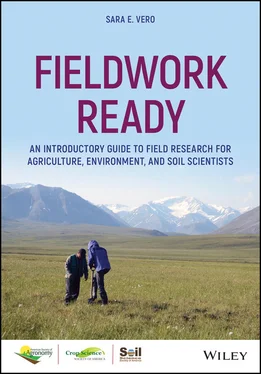Source: Rachael Murphy.
People often question why they are doing fieldwork (sometimes loudly and with profanity) too late. This is often midway through their experiment, with the weather closing in, as they are struggling to collect samples! It is actually the most important question you can ask yourself and is the driver for all of the decisions you will make during the planning process. Asking “ Why?” will help you identify the appropriate design of your experiment. It is important to remember that the experiment should be designed to test your specific hypothesis (possibly excepting case studies – discussed later). You should not choose to perform any fieldwork without examining whether it can provide appropriate , sufficient , and timely data relating to your hypothesis.
Let us briefly unpack these three qualities. Is the data you intend to collect appropriate to your hypothesis? For example, if you are examining nitrogen use efficiency in soybeans, you will probably need to account for nutrient inputs, crop uptake, leaching, and gaseous losses. You will also need meteorological and soil data for context. All of this data is relevant to your hypothesis. Other data may not be appropriate. For example, the traits of your soybean species relating to disease resistance might be relevant to soybean research in general, but if it is not a factor in nitrogen use efficiency, then examination of these traits (which are important themselves) are not appropriate to your study.
Sufficient data means that you have enough measurements to satisfactorily answer your research question. That means enough sites, variables, blocks and/or plots, and replicates. In crop studies, it may mean having multiple growing seasons. There is no real rule of thumb for this. Let the literature guide you and if possible, consult a statistician before beginning your experiment. It is not pleasant to realize that more replications are needed once a study has started, and even worse to discover once the field trial is “finished”!
Finally, you need timely data. That means that both the collection and analysis of the data is physically achievable for you and your coinvestigators, and ultimately, possible within your project timeframe. This is closely related to having sufficient data, and a balance must be achieved between gathering enough samples and completing your research in good time. If you have embarked on a two‐year MS program, there is little point in designing a field experiment involving three years of monitoring! This might seem obvious, but it is very common for fieldwork to overrun projected timescales.
Particularly in the early weeks of a project, it is common for individuals to rush into fieldwork due to enthusiasm and eagerness to collect data – any data! However, if the data is not relevant, the methods or site are inappropriate or the experimental design is weak, the fieldwork often results in much wasted time and resources and flaws that are revealed during the peer‐review process. There may be lessons learned in this process, but that time would be better spent in scrutinizing “why do this?” and in planning, so that your work can succeed from the beginning. As an example, I once was asked to give advice to a PhD student in relation to a sampling campaign he had embarked on. When I asked why he had chosen to collect samples from a certain location near his campus, he responded “Well it was convenient, and I needed to get started.” However, in his rush for data, he had chosen a site that was completely unsuitable to the method of analysis he was developing, and so had wasted months of valuable time.
Some whys:
To obtain data that will allow you to examine a hypothesis or question
To provide contextual information
To examine “real‐world” case studies
To gain skills and experience
To test the performance of devices, processes, or tools
For graduate students there are two main concurrent goals. First, to explore and hopefully fill a knowledge gap in their particular discipline, by conducting a series of related experiments culminating in a thesis. The other goal is to develop skills that they can apply to other research projects or to industry. This goal is by no means less important than the scientific objective. Fieldwork is a fantastic opportunity to develop practical skills, problem solving, logistical skills, and teamwork. It is often relatively simple to get a sensor working in the lab when you have tools at hand, good lighting, and someone to ask for help. Can you do it on a rainy day, far from your office when you can't find your screwdriver? From an employer's perspective, the exact detail of your (no doubt important and complex) past research may or may not be interesting or applicable to the role you are interviewing for, but your ability to learn and apply practical skills will help you to be useful and effective in any situation.
Before embarking on a campaign of fieldwork, ask yourself these questions:
1 What am I trying to examine?This is the first and most important question to ask yourself. It must be related to your hypothesis or question. Your fieldwork must do one (or both) of the following:Provide information that either proves or disproves your hypothesis. For example, your hypothesis might be “Soil compaction reduces the yield of perennial ryegrass over three years.” Your fieldwork must then measure differences in the yield of perennial ryegrass under both compacted and non‐compacted conditions. Critically, it must be measured over three years. A two‐year study won't answer your hypothesis!Provide contextual information that helps explain your results or their implications. For example, let's say you conduct an incubation study in the laboratory to measure denitrification in soil at various temperatures. In that scenario, you can impose whatever temperatures you like. What temperatures are actually encountered in a real soil, outdoors and exposed to the weather? So, you might conduct fieldwork in which you install sensors to measure temperature over time. This provides context for your laboratory study and helps you to examine its relevance in the discussion section of your paper or thesis.
2 What treatments do I need to examine my hypothesis?A treatment is the condition, practice, or manipulation that you apply to your field site. This will depend entirely on your hypothesis, and in many field studies, multiple treatments may be applied either in isolation or in combination with one another. In surveys or case studies, there may not be any treatments at all, since you are measuring the state of a person, place, animal, or thing, or are documenting a particular event or situation. When a treatment is applied, there should always be a control that is not modified, against which you can compare your results.
3 What do I need to measure?Again, this comes down to your hypothesis. You need to measure the variables that you expect might be altered by your treatment. If you are examining the effects of light pollution in urban areas on the behavior of a certain bird species, then you might want to measure how frequently the birds eat, sleep, mate, or sing. However, you must also quantify the treatment. In this case, how many hours of light are the birds subject to, relative to a non‐polluted situation?Collecting supplementary information during your fieldwork is also useful because it either helps explain what you observed or it may help your reader to evaluate how applicable or transferable your results are to their own situation ( Fig. 1.9). Some examples are location (latitude, longitude, elevation, country) or weather variables (precipitation, temperature, humidity). There are, of course, many other details that are relevant in different fields of study, so think carefully before launching your field campaign. It is usually far easier to collect data at the time rather than returning for further data collection when a reviewer has asked for it! Look at the literature on related studies as a guide. For example, if everyone conducting a river survey typically describes whether their study area is a first, second, or third order stream, this is a good indicator to you that this is highly relevant information. As you become more familiar with your field of study identifying what contextual measurements you should take will become more obvious.
Читать дальше












